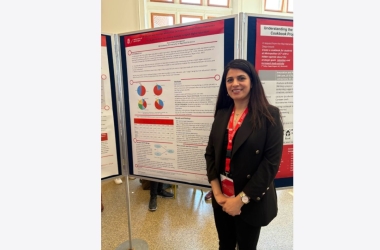Wittenborg Graduate Presents Research on AI Literacy at EuroSoTL Conference 2025
Wittenborg Graduate Presents Research on AI Literacy at EuroSoTL Conference 2025
Wittenborg Graduate Presents Research on AI Literacy at EuroSoTL Conference 2025

Azar Kord Among 300 Participants Presenting at University of Groningen’s EuroSoTL Conference
Azar Kord, a recent MBA (Master of Business Administration) graduate from Wittenborg, presented her research on AI literacy at the prestigious EuroSoTL 2025 conference held at the University of Groningen, from 18 to 20 June.
Originally from Iran and a former teacher, Azar’s academic journey has been guided by her former supervisor in Iran, who supported both her master’s degree and this particular research project. Now based in the Netherlands, Azar intends to continue her academic career by pursuing a PhD in the country.
The EuroSoTL conference welcomed around 300 participants from across Europe and beyond. Its theme, 'Making Connections through the Scholarship of Teaching and Learning', reflected a commitment to fostering collaboration across disciplines and encouraging innovative teaching practices that address global challenges, such as digital transformation and sustainability.
Azar’s research poster, titled AI Literacy and Intrinsic Motivation: Self-Determination Theory Outcomes for Students from Developing Nations in Dutch Higher Education, explores the relationship between AI literacy and intrinsic motivation among students from developing countries studying in Dutch universities. Using Self-Determination Theory (SDT) as a framework, her study examined how AI literacy influences students’ feelings of autonomy, competence, and relatedness in AI-enhanced learning environments.
The study surveyed 386 students and found that higher AI literacy significantly increased students’ sense of competence and autonomy, which in turn enhanced their intrinsic motivation. While relatedness played a supportive role, it was less prominent in driving motivation. The research highlights the importance of designing AI-integrated curricula that empower international students, especially those from regions with limited AI infrastructure and predominantly teacher-centred education systems.
Speaking about her experience at the conference, Azar reflected on the importance of building her academic profile: “I have many classmates from developing countries. When I decided to begin the PhD process, I needed to connect my research and strengthen my CV."
She added that EuroSoTL was an inspiring opportunity to meet and collaborate with researchers from across the globe: “At the conference, I met people from Australia, the US, Canada, the UK, Norway, and China. It was motivating to connect with such a diverse group of academics.”
WUP 09/09/2025
by Erene Roux
©WUAS Press
Tags
#SDG4: Quality Education
#SDG10: Reduced Inequality
#Internationalisation
#Diversity
#research
#internationalstudent
389 words